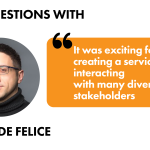New blog series! The WEMC team share what makes them tick for working in climate services
The WEMC tech team create climate service tools to help bridge the gap between the energy industry and the wider climate science community. Our technical team utilize their extensive backgrounds in computer science, environmental engineering, meteorology, geophysics, and climate/environmental sciences to produce tools that offer a positive user experience.
In this series, we will be reaching out to some of the members of our technical team to find out their motivations and inspirations behind working within the climate data and climate services field.
Today we hear from Beatriz Contreras, our data analyst with over 20 years’ experience with data analysis and GIS, and a PhD in Environmental Sciences. Beatriz became interested in climate change when she was finishing her BSc in Biology and came across a book showing evidence of tree species and animals migrating towards the poles and uplands, due to global warming. After completing her BSc, Beatriz spent time doing fieldwork in a Cloud Forest.
“Every day, all my clothes would be wet from the dew accumulated overnight on plants and shrubs. It was beautiful to see the forest amongst the mist in the early hours of the day. Vegetation was lush and healthy, with many mushrooms, orchids, snails and small streams.”

Years later, after completing her MSc where she had her first real exposure to meteorology and ocean-atmospheric processes, Beatriz returned to the same place to work, and noticed the significant, adverse climate change impacts on the cloud forest.
“During my return trip, my clothes would remain dry every day and fires and droughts in that region were becoming common, especially after a strong El Niño year. The streams, mushrooms and snails were gone. I kept thinking, what does it take to burn a cloud?”
“Working for climate services for energy might seem a bit far from where I started, but I can see this is where my job can make more impact. After all, this crisis is all about the energy sources we are using and how we use our resources in general”.
We were keen to find out the tech teams’ opinions on the key benefits of climate services and their relevance in the near and far future. Beatriz noted that both climate services and raising awareness are key for the near future, but perhaps more importantly for now, as the now is the only moment where we exist and can influence.
“Currently, we are in a fast-closing window where we can still implement actions to ameliorate the change. Climate services are very important because all aspects of life are going to be affected by the changing climate. Stakeholders from different sectors need the information to plan adaptation pathways, weatherproof infrastructure and processes, and implement actions to counterbalance the inevitable changes”.
Beatriz noted that climate services are needed to inform key aspects of the conservation of ecosystems, agriculture, urban and rural planning, building design, health, water access, and of course for the energy sector.
“The transition to renewable sources of energy along with slowing growth and consumption, and ecosystems/soil conservation, are actions that will have the most impact on slowing global warming”.
“People need to realize the deep connection of their lives with geochemical cycles (carbon, water, nitrogen) as after all, we are made through these elements and our molecules get replaced on a regular basis. So, the cycles go through us as well. In the same sense there is a real connection between our lives and atmospheric/oceanic processes. We are now witnessing firsthand and through news outlets what happens when these processes – that occur on a planetary scale – get out of balance”.
Considering this, Beatriz outlined what she believes to be necessary for the future of effective climate services.
“If people from all levels of power and responsibility realized these points. If we realized that these processes are beyond our human capacity to control them, and that we are all vulnerable, our behaviour and how we go about our daily lives would be different. We need policies that correct this upside-down vision and that put planetary life on top of economic benefit”.
Please subscribe to the WEMC newsletter and follow us on Twitter, LinkedIn and YouTube to stay up to date with our events and news.




